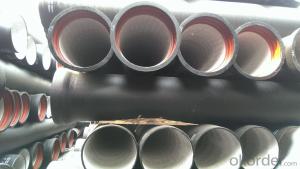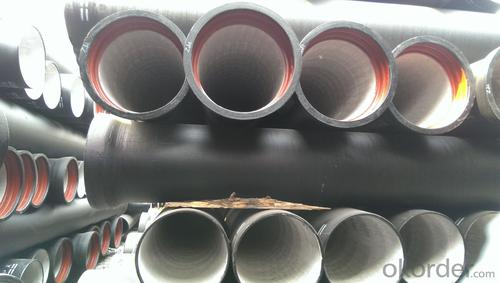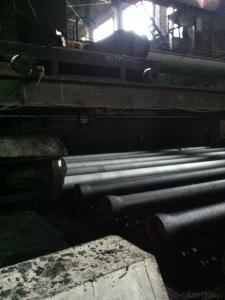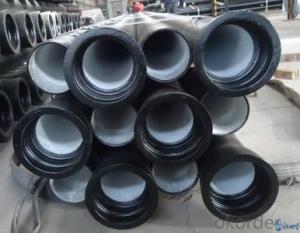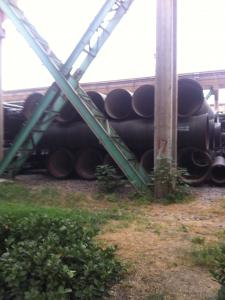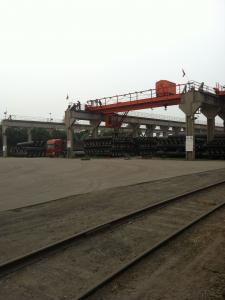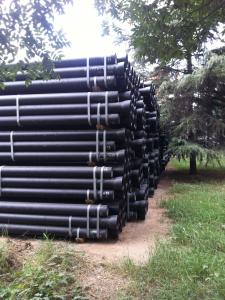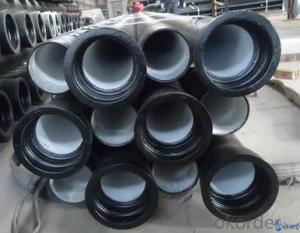DUCTILE IRON PIPES & PIPE FITTINGS K9 CLASS DN125
- Loading Port:
- Tianjin
- Payment Terms:
- TT OR LC
- Min Order Qty:
- 22 pc
- Supply Capability:
- 3000 pc/month
OKorder Service Pledge
OKorder Financial Service
You Might Also Like
Material : Ductile Cast Iron
Size Range : DN 80mm to DN 2000mm
Unit Effective Length : 6m or 5.7m
Manufacture Standard: ISO 2531:1998/ EN 545:2006/EN 598:2007
Annual capacity : 200,000 tons
Coating Exterior: Zinc 130g/m2 according to ISO 8179-1 and bitumen coating 70 microns.
Cement Interior: Portland Cement/ High Alumina Cement/ Sulphate Resisting Cement Lining according to ISO 4179
Special requirements on external coating and internal lining can be applied
We also provide accessories such as SBR/EPDM rubber gaskets, lubricant paste, pipe caps, PE sleeves, etc.
Additional Parts:
Each pipe is strictly inspected according to related standard to ensure permanently high performance.
Easy Installation at site and service free for life
Long Service Lifespan
Quotation will arrive you within 24hours once we get your inquiry.
We guarantee offering you a competitive price.
A copy of original inspection reports of pipes will be offered after shipment.
Photos of loading process will be sent to the customer after shipment effect.
We will follow-up the delivery progress after shipment effect and update to the customer on weekly basis.
- Q: Why is the sound speed of nodular cast iron lowered after heat treatment?
- Sound travels faster in a solid than it does in a liquidOr so, after heating, the intermolecular repulsion decreases, so that the same potential energy conduction requires molecules to move more distances, making the transmission slower
- Q: How are ductile iron pipes protected against external corrosion?
- Ductile iron pipes are protected against external corrosion through a combination of manufacturing processes and external coatings. The first line of defense is the inherent corrosion resistance of ductile iron itself. The iron is treated with a special alloying element, typically magnesium, which forms a protective layer on the surface of the pipe. This layer acts as a barrier against corrosion and helps to extend the lifespan of the pipe. In addition to the corrosion-resistant properties of the iron, ductile iron pipes are also externally coated with protective materials. One common method is to apply a layer of asphaltic or bituminous coating to the pipe's surface. This coating acts as a barrier against moisture and corrosive substances in the soil, preventing them from coming into contact with the iron. It also provides a layer of insulation, reducing the likelihood of galvanic corrosion. Another method of external corrosion protection is the use of fusion-bonded epoxy (FBE) coatings. FBE is a thermosetting resin that is applied to the surface of the pipe and then heat-cured to form a strong and durable coating. This coating provides excellent resistance against corrosion, abrasion, and impact, making it a popular choice for ductile iron pipes in harsh environments. In some cases, additional protective measures such as cathodic protection systems may be employed. These systems use electric currents to counteract the corrosion process by supplying electrons to the pipe's surface. This helps to prevent corrosion from occurring, especially in areas where the coating may have been damaged or compromised. Regular maintenance and inspection are also crucial in ensuring the long-term protection of ductile iron pipes against external corrosion. This includes periodic cleaning, repair of any coating damages, and monitoring the integrity of the protective layers. Overall, the combination of the inherent corrosion resistance of ductile iron, external coatings, and maintenance practices ensures that ductile iron pipes are well-protected against external corrosion, allowing them to have a longer lifespan and deliver reliable performance in various applications.
- Q: What are the typical installation methods for ductile iron pipe?
- The typical installation methods for ductile iron pipe include trenching, horizontal directional drilling, and jacking. In trenching, a trench is excavated and the pipe is laid and supported on a bed of aggregate. Horizontal directional drilling involves drilling a pilot hole underground and then pulling the pipe through the hole. Jacking is a method where the pipe is pushed into the ground using hydraulic jacks.
- Q: Can ductile iron pipe be used for water treatment plant applications?
- Ductile iron pipe is indeed applicable for water treatment plant purposes. Renowned for its robustness and endurance, this type of pipe is well-suited for the conveyance of water and other liquids in diverse industrial environments, such as water treatment facilities. Its exceptional resistance to corrosion and capacity to endure substantial pressure and temperature make it an ideal selection for scenarios where the pipe is exposed to chemicals, disinfectants, and other treatment procedures. Moreover, the installation, maintenance, and repair of ductile iron pipe are straightforward, rendering it a cost-efficient alternative for water treatment plant infrastructure.
- Q: How can the internal and external walls of ductile iron pipes be protected from corrosion?
- Internal walls can be painted anti-corrosion paint, exterior anti-corrosion can choose to paint, but also useful anti-corrosion tape, or do 3PE anti-corrosion, look at your anti-corrosion requirements, cost budget and other construction objective conditions.
- Q: How are ductile iron pipes transported and stored?
- Ductile iron pipes are typically transported and stored in a careful manner to ensure their integrity. They are commonly transported by trucks, rail, or waterways, using appropriate handling equipment such as cranes or forklifts. During transportation, they are secured to prevent any damage or movement that could affect their structural integrity. When it comes to storage, ductile iron pipes are usually stacked horizontally on stable surfaces, such as concrete or pallets, to prevent any deformation or bending. They are often stored in covered areas to protect them from weather elements that could cause corrosion or other damages. Additionally, pipes should be stored in a well-ventilated space to prevent moisture accumulation and potential rusting. Regular inspections are also conducted during storage to identify any signs of damage or deterioration. Overall, proper transportation and storage practices are crucial to maintain the quality and longevity of ductile iron pipes.
- Q: DN300 how long is it for water polo and iron pipes?
- Blue interface cast iron pipe, blue fixed inner cushion rubber, blue gasket seal; rigid joint like cast iron pipe mouth, compared with straight pipe inserted cement sealing process, has been basically eliminated
- Q: Are ductile iron pipes resistant to abrasion or wear?
- Indeed, ductile iron pipes exhibit remarkable resistance against abrasion and wear. Renowned as cast iron as well, ductile iron represents a robust and enduring substance exclusively crafted to endure abrasive circumstances. Ductile iron's distinct microstructure grants superb resistance to abrasion, rendering it an optimal selection for scenarios wherein pipelines face extensive levels of wear. Furthermore, the extended lifespan of ductile iron pipes showcases their enduring capacity against abrasion and wear throughout time.
- Q: What do ductile iron pipes need to connect with three? Can I contact it directly?
- The new process adopted at present is groove connection. With groove parts, of course, your ductile iron tube should also be grooved!
- Q: Ductile iron and gray iron is what are the advantages and disadvantages of it
- Comparison of nodular cast iron and cast steelThe strength of nodular cast iron is comparable to that of cast steel. Ductile iron has higher yield strength, the lowest yield strength is 40K, while the yield strength of cast steel is only 36k. In most municipal applications, such as water, brine, steam, ductile iron has more corrosion resistance and oxidation resistance than cast steel. Because of the spheroidal graphite microstructure of nodular cast iron, nodular cast iron is superior to cast steel in reducing vibration ability, so it is more beneficial to reduce stress. An important reason for choosing ductile iron is that ductile iron costs less than cast steel. The low cost of ductile iron makes this material more popular, more efficient and less costly for ductile iron.
Send your message to us
DUCTILE IRON PIPES & PIPE FITTINGS K9 CLASS DN125
- Loading Port:
- Tianjin
- Payment Terms:
- TT OR LC
- Min Order Qty:
- 22 pc
- Supply Capability:
- 3000 pc/month
OKorder Service Pledge
OKorder Financial Service
Similar products
Hot products
Hot Searches
Related keywords
